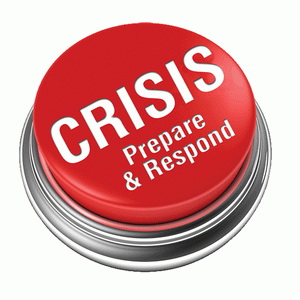McDonald’s, Houston Methodist Hospital, Publix – what do they have in common? In just the past few weeks, they have all faced a crisis that impacted their business and the trust placed in them by their customers, employees, and the public.  And these are just three of many organizations that faced crises threatening their businesses and reputations recently.
And these are just three of many organizations that faced crises threatening their businesses and reputations recently.
The crises were varied and happened suddenly. McDonald’s experienced a data breach that exposed customer information. Houston Methodist Hospital faced an employee walkout over its vaccination policy that thrust it into the national conversation and also impacted its ability to handle patient care. Publix experienced a fatal shooting in one of its stores necessitating closing the location for several days and putting the company in the spotlight of law enforcement, local and national media, and key constituent groups.
Maybe you won’t experience any of these situations, but most companies and organizations, including yours, face impending crises every day. They range from not being able to find enough employees to work necessitating a reduction in services or delayed response time, not being able to source enough products to sell, or have a disgruntled customer making their rage public and causing a viral sensation and not one favorable to the company. All organizations face threats of data breaches, website hacks, phishing attacks, identify theft, HR issues, or employees, donors or volunteers complaining on social media.
Controlling a situation before it becomes a full-blown crisis requires a quick, decisive, and proactive response. Facts must be disseminated. Clients, customers, employees, and stakeholders must be reached, engaged, and reassured. Media provided with current and correct information. Social media followers calmed and their misinformation minimized. Delays of even a few hours can deeply harm businesses and organizations and their reputations.
A ready-to-go crisis communications plan will allow you to respond immediately and effectively. It should:
- Identify every possible scenario that can impact your business negatively and have a written plan(s) to address them, including detailed (day and night) contact information, target audiences, written action plans for each crisis, and pre-written communications scripts, media statements, and digital posts.
- Designate a leader who will spearhead the communications plan and also decide when to pull the trigger. Also appoint a back-up since the designated leader may not be available when the crisis hits (due to the issue, illness, out of town travel, etc.). Remember you need someone who will be accessible 24/7 for the duration of the situation.
- Address contingencies to implement the plan despite obstacles, such as interruptions in power, technology, or unavailable executives.
- Determine what platforms and vehicles you need to communicate to your audiences, based on the crisis. Some communications and crises need to be addressed online and widely on all your digital platforms; others need to be taken offline immediately so the crises can be contained and managed before they become widespread. This determination needs to be made before the crisis hits and acted upon immediately at the outset of the situation.
- Don’t forget to engage your employees. You should let them know what’s happening, but do not empower them to be your corporate spokespersons. Effective crisis communications requires the company speak with one voice, so all communications should be centralized and at the highest levels of your organization.
Execution and timing are critical. Don’t pull the trigger if there’s just a bubbling of a problem, but don’t delay if there is one. Proper timing will help ensure you don’t create another problem by botching the handling of the first. Then, follow through. When the crisis is over, take the time to assess the damage to your organization and its reputation and then get started on meaningful repair/reputation management initiatives and communications.
Don’t know how to get started? It’s probably best to work with an outside public relations consultant who can develop a customized crisis communications plan and playbook that will address all situations relevant to your business, industry, community, and HR needs. Once these materials are developed, you can decide if you want to handle the crisis communications internally or bring in outside resources while you manage the operational aspects of the crisis internally when the situation occurs. But you’ll have the tools at hand to move quickly and properly.
Remember, proper crisis communications planning can actually help you avert a crisis that will inflict long-term damage to your business and reputation. You may only have minutes to save your reputation and business, so prepare now.
